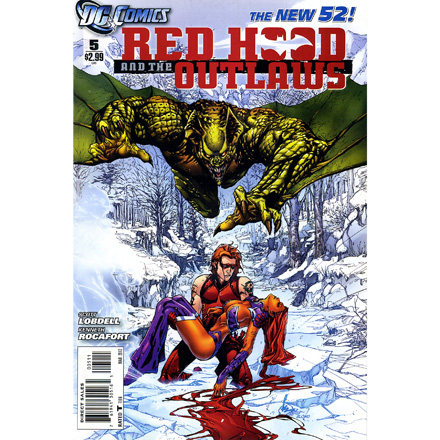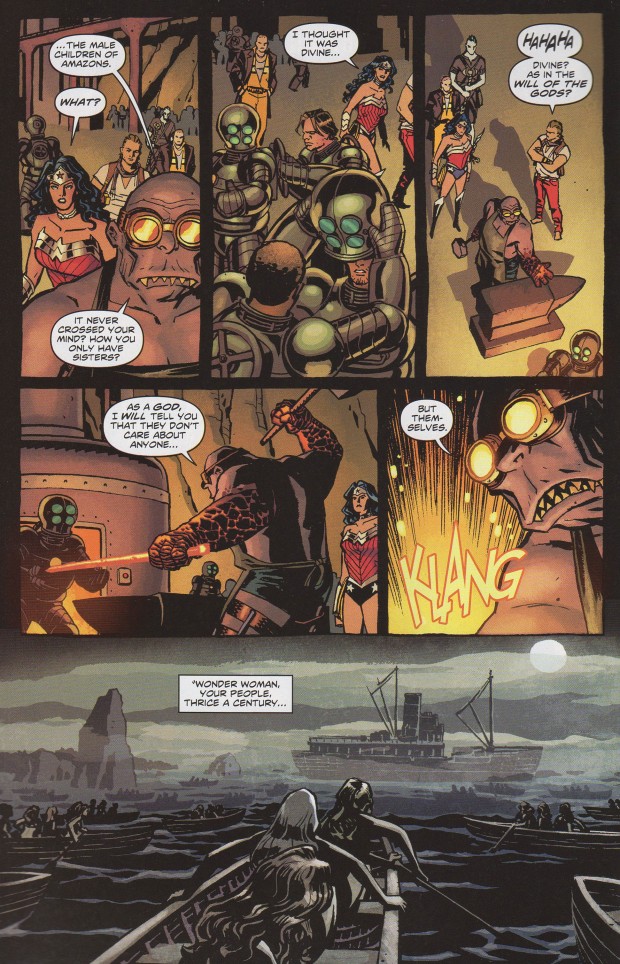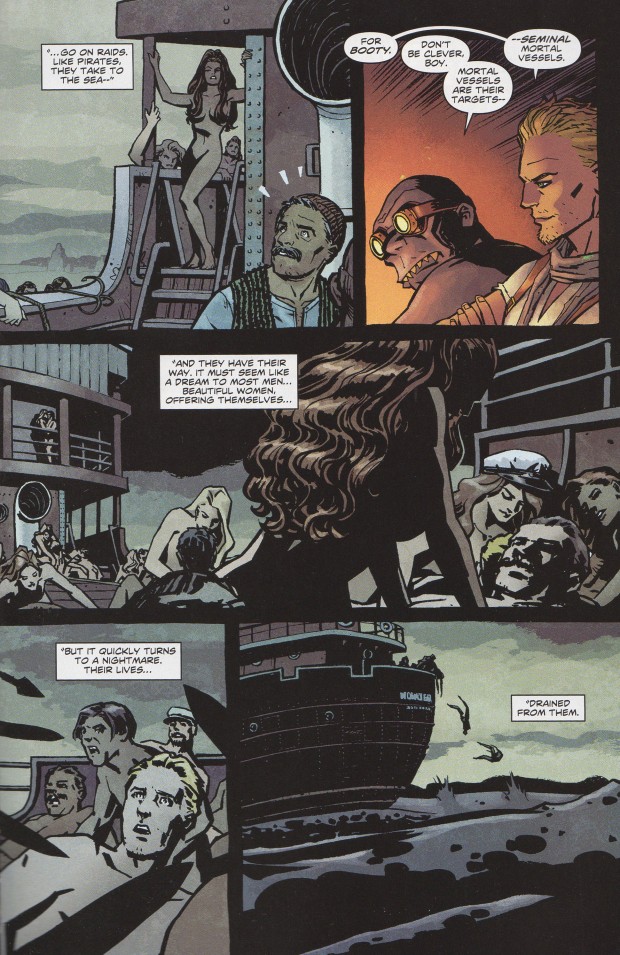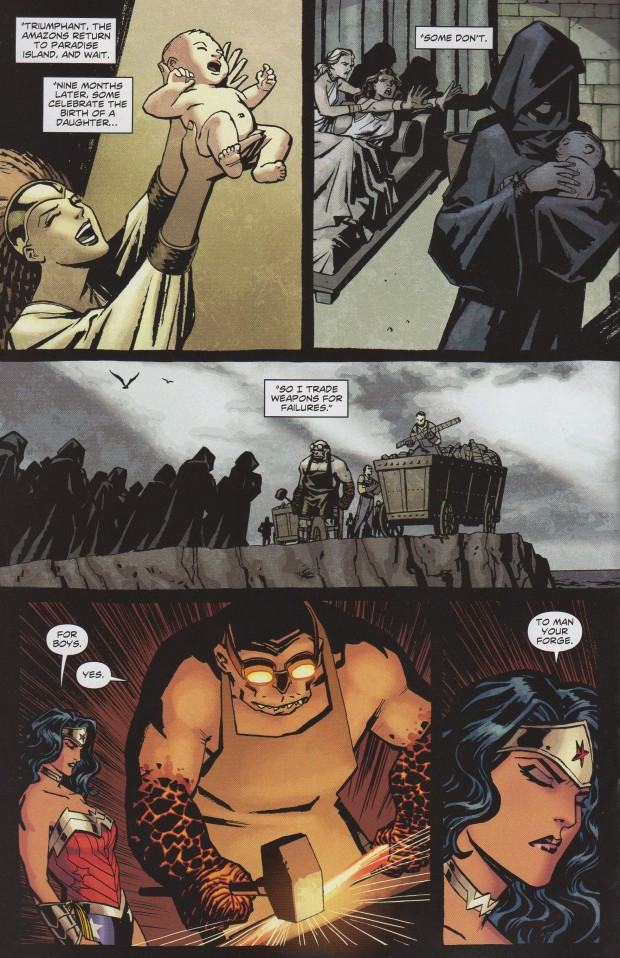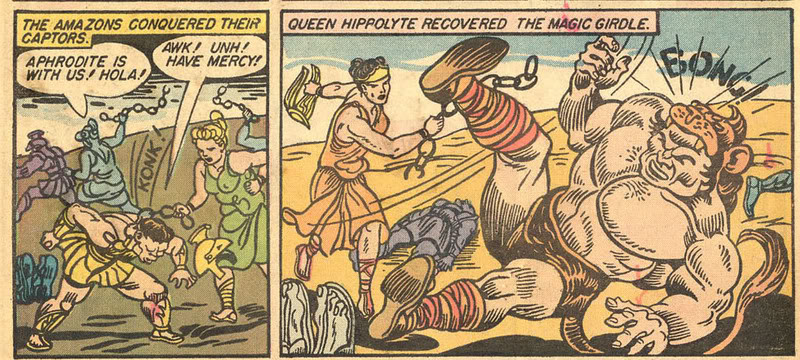A version of this first appeared in The Chicago Reader
______________
Eight months ago DC launched the New 52, restarting all of its titles from #1 and transforming the pop culture universe as we know it. From Salon to Rolling Stone to the Atlantic to the Chicago Reader itself, the excitement among columnists, bloggers, and alternative news sources has been almost uncontainable. It’s like Game of Thrones…except 52 times!
Or, you know, possibly not. The truth of the matter is, back in September some mainstream outlets were mildly interested and/or just couldn’t resist the opportunity to put “Pow! Boom!” in a headline. Shortly thereafter, a few people kind of sort of notice that a bunch of the DC titles were sexist crap even by the admittedly low standards of stupid pop culture detritus. And after that, basically, nothing. Comics blogs still follow this stuff, but in the real world, nobody cares.
And if you want to know why nobody cares…well all you have to do is pick up some of those new titles. You would think that the purpose of a massive relaunch would be to create an easy-in for new readers — why reset to #1 if you’re not going to start at the beginning? But when I picked up a handful of titles this week, I found myself right back in the same Comic Nerds Only space I remembered so well from the days when I used to occasionally read this crap. In Animal Man, our hero is discovering that Everything He Ever Knew About Himself Was Wrong, just like Swamp Thing did back in the famous Alan Moore run from the 1980s — and, indeed, writer Jeff Lemire is actually literally cobbling together his new (New!) Animal Man from random plot elements Moore used thirty years ago. In Wonder Woman, our heroine is discovering that Everything She Ever Knew About Herself Was Wrong, and that she’s actually the daughter of Zeuss which allows lots of Gods to wander in and out saying profound things like they were in Neil Gaiman’s Sandman comic from, oh, 30 years ago (the early Sandman issues, specifically, when Gaiman was still trying to write horror like Alan Moore.) In Batman, our hero is discovering that Everything He Ever Knew About Himself Was Wrong (are you detecting a pattern?) though, to give him his due, writer Scott Snyder’s drooling, insane, drugged out and victimized Batman is pretty entertaining, especially if you’re as sick of the character as I am. And then there’s Red Hood and the Outlaws, which has accomplished the impressive feat of taking only seven issues to create an intricate backstory which feels tedious enough to have been going on for decades.
The point here isn’t that these comics are formulaic pulp crap. They are formulaic pulp crap, but goodness knows I’m willing enough to consume formulaic pulp crap if it’ll meet me half way. I really liked the superhero found footage exercise Chronicle, for example. I even had a place in my heart for the recent The Thing remake. I’m not proud.
And yet, even by those low standards, the DC relaunch is just surprisingly unpleasurable. And while I would like to blame the creative teams, I don’t think it’s entirely their fault. Red Hood is truly embarrassing shit, but the writers and artists on Animal Man, Wonder Woman, and Batman are all competent enough pulp creators as these things go. It isn’t their fault that they have to use 50 to 70 year old characters to tell utterly irrelevant stories to an audience of ever-more-insular fanboys (and yes, it is almost entirely boys.) Serialized television pulp, a genre which was once almost as scorned as comics, has rejuventated itself by scampering shamelessly after controversy and high concept. 24, with its countdown and its terrorism and its torture is maybe the most egregious example, but Mad Men qualifies with its period feel gimmick, and so does Breaking Bad with its “Meth! The drug of the moment!” schtick.
That’s the way pulp’s supposed to work; it’s supposed to be crass and time-bound and desperate for the next new shiny thing. Not superhero comics, though; they don’t even bother trying — presumably because their audience doesn’t want them to. My friendly local comics retailer, James Nurss at First Aid Comics in Hyde Park, told me that in his store DC has had a significant boost in sales since the reboot. Marc-Oliver Frisch, a journalist who covers comics sales figures for news site The Beat, confirmed that this was the case industry-wide. Both, however, suggested that the boost in sales is not from new readers. Instead, the bump is from what Frisch referred to in an email as “lapsed” readers (his quotes) — people who, Nurss suggested, moved to Marvel titles, or people who’d stopped buying DC some years back. It’s buyers from within the subculture, in other words, not anyone from outside it. Or, as Frisch concluded, “I think it’s fair to say that, thanks to the ‘New 52,’ DC is making more money selling more comic books to more of the same direct-market customers; no more, no less.”
The other part of DC’s reboot was a move to start releasing digital comics on the same day as print. Nurss, whose store carries a good amount of alternative and children’s comics as well as mainstream titles, feels that the change to digital may transform the comics industry, making it possible for new kinds of comics — and new kinds of audiences — to get a foothold. Maybe so, but after slogging through this pile of uninspired and unambitious dreck, it’s difficult to get too excited about comics future.
And just in case you think it’s only a problem for DC — I also bought a couple of Marvel’s Avengers vs. X-Men comics in honor of the new Avengers film. Apparently the Phoenix force is endangering us all, just like it did 30 years ago when Chris Claremont and John Byrne wrote X-men stories that were at least marginally creative, even if they were using other people’s characters. These days, though, the best you can hope for is that one of the same old heroes will discover that everything he (or possibly she) knew about himself was wrong. At which point he (or less likely she) will slog bravely forward through the torpid drifts of continuity while the rest of the world get its schlocky pulp fun from television or YA novels and its superheroes, if it must have them, from the big screen.

